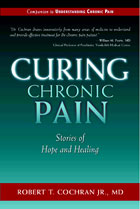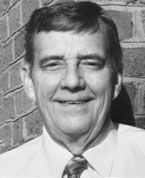Clarksville, TN – Dr. Robert T. Cochran Jr. will be reading and signing copies of his new book, Curing Chronic Pain, on Saturday, April 4th at 3:00pm at Borders on Wilma Rudolph Boulevard in Clarksville.
 “I believe you will marvel, as I constantly do now, at just how much a doctor can learn in four years.” — Robert T. Cochran Jr., M.D.
“I believe you will marvel, as I constantly do now, at just how much a doctor can learn in four years.” — Robert T. Cochran Jr., M.D.
In Understanding Chronic Pain, Cochran’s first book, he spoke with patients about their experience with unrelenting pain, developing a “thesis that chronic pain was a form of mental illness, and that by understanding and treating the mental illness one could often cure chronic pain.” Cochran saw links between chronic pain and issues such as childhood trauma, depression, substance abuse and bipolar disorder.
In Curing Chronic Pain, that thesis has been developed with much more depth and refinement, and offers examples of dramatic cures obtained by the treatment of underlying mental illnesses, often with drugs not conventionally used for that purpose.Curing Chronic Pain uses anecdotes to illustrate specific experiences of pain.
In explaining chronic pain, Cochran defines it as:
- Pain that persists beyond expected recovery time
- Pain that extends beyond the original scope of the injury
- Disordered sleep with worsening pain at night
- Disordered appetite with weight gains, cravings for sweets or, conversely, weight loss with disgust for food
- Disorders of mood (despondency, depression or its opposite, restless hyperactivity/angry irritability)
- Diminished energy and pervasive fatigue
Q: You have been practicing medicine for over 40 years. How did you come to focus on chronic pain?
 Dr. Cochran: From early on, I developed great empathy for victims of chronic pain. I felt that their disease was misunderstood, and that they were often mis-served by the medical community because of the suspicion that their pain was an excuse for the use of addictive drugs. I found that by removing myself from this preconception and listening – in detail – to what my patients told me, I could better appreciate and understand their illness. That practice has served me well, for I have learned that only by skillful interview can one correctly diagnose and treat the victim of chronic pain.
Dr. Cochran: From early on, I developed great empathy for victims of chronic pain. I felt that their disease was misunderstood, and that they were often mis-served by the medical community because of the suspicion that their pain was an excuse for the use of addictive drugs. I found that by removing myself from this preconception and listening – in detail – to what my patients told me, I could better appreciate and understand their illness. That practice has served me well, for I have learned that only by skillful interview can one correctly diagnose and treat the victim of chronic pain.
Q: How is Curing Chronic Pain different from your first book, Understanding Chronic Pain?
Dr. Cochran: Understanding Chronic Pain was, in its way, a breakthrough book because it developed the thesis that chronic pain was a form of mental illness, and that by understanding and treating the mental illness one could often cure chronic pain. In Curing Chronic Pain, that thesis has been developed with much more depth and refinement, and I offer examples of dramatic cures obtained by the treatment of underlying mental illnesses, often with drugs not conventionally used for that purpose.
Q: For many, you are their last hope when it comes to treating their chronic pain. How is your approach different from a more traditionally minded doctor?
Dr. Cochran: General physicians are obligated to search for the cause of pain as some form of injury to the body. However in many, indeed most, cases, a precise cause cannot be identified. When such patients are referred to me, I search for the cause of chronic pain not as injury to the body but as injury to the mind. Therefore, I spend my time researching my patients’ personal, social, and emotional history in an effort to understand their pain, often with dramatically successful outcomes.
Q: What is your opinion regarding the use of addictive drugs such as opiates and stimulants?
Dr. Cochran: I am an enthusiast for their use in the appropriate circumstances (and there are many). I have learned that the risk of addiction is less than I originally thought and, most remarkably, I have learned that the judicious and careful use of addictive drugs can not only diminish pain, it can cure mental illness.
Q: What message would you like to convey in Curing Chronic Pain?
Dr. Cochran:There is hope. It is a logical hope, and it is a scientific hope, and it is a realistic hope. It is the hope that derives from realization that the victim suffers a biochemical disease of the mind that can be cured with pharmacy. That is my message.
Dr. Cochran is a graduate of Vanderbilt Medical School and completed residency in internal medicine and neurology at the University of Texas and Duke University. He founded a private medical practice in 1963 and had over the years treated thousands of patients with chronic pain.
He is co-director of the Pain Center at Centennial Hospital in Nashville. He lives in Nashville with his wife, Donna.


